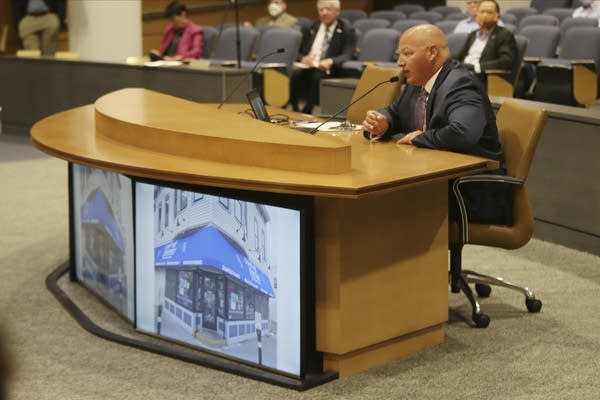Different priorities on display in hearings related to Floyd killing

Go Deeper.
Create an account or log in to save stories.
Like this?
Thanks for liking this story! We have added it to a list of your favorite stories.
Updated: 5:07 p.m.
Dueling legislative hearings Wednesday focused on events surrounding the police killing of George Floyd, with senators drilling down on destructive disturbances in the days after and the House examining police accountability bills that remain hung up.
Senate Republican leaders set the tone of their hearing with an 18-minute video of news clippings describing a chaotic string of nights after Floyd’s killing on Memorial Day.
It was the first of several hearings planned to dissect the city and state government responses to the unrest, which left many businesses looted, vandalized and burned.
Representatives of a half-dozen businesses, including convenience store operator Bobby Awaijane, gave voice to the unease of those nights in late May and early June. He and his family watched on a real-time video feed as dozens of people broke into their Stop-N-Shop station in Minneapolis.
Turn Up Your Support
MPR News helps you turn down the noise and build shared understanding. Turn up your support for this public resource and keep trusted journalism accessible to all.
They were “just there for destruction, throwing things off shelves, just breaking stuff, windows, the ATM. They went straight for the ATM,” he told lawmakers.
Awaijane said his family called 911, but was told anything short of life-threatening wouldn’t elicit a timely response.
“We were like it is life threatening because it’s a gas station and there’s over 10,000 gallons of fuel in the ground,” he said.
Across town in St. Paul, Jim Stage did get help. But it was too late to save his business — the century-old Lloyd's Pharmacy.
“The Fire Department fought the fire all night,” Stage said. “I got there at about 6:30 in the morning and they were still fighting it. And it was a shell.”
Stage brought pictures and he grew tearful as he described the day his store was ransacked and ultimately burned. It was a complete loss. He’s owned it for more than five years after interning there and visiting as a boy growing up in the Midway neighborhood.
“We hope to rebuild. I’ve talked to people about that. The community loves our pharmacy,” Stage said. “I think it’s a tragic thing that happened. But I forgive the people who did it.”

Lonnie McQuirter, a service station owner in Minneapolis, said the community was on edge.
“On places that didn’t survive being looted and burned down and the look of terror in those people’s eyes and whatnot who watched it happen and watched as people who had their smartphones out recording but didn’t do anything,” McQuirter said. “There was no firemen, no police.”
Sen. Warren Limmer, R-Maple Grove, said it shouldn’t have come to this.
“I had constituents — many of them were mad, infuriated and, more importantly, fearful,” Limmer said.
They deserve to know who dropped the ball, he said.
“And the question kept coming up: Where is the police? Where is the fire emergency personnel, where was the government to protect life and property?”
Sen. Scott Dibble, DFL-Minneapolis, said the discussion was the wrong one. He criticized Republicans for not spending as much time on delving into policing policy and behavior as they were intending to devote to the events sparked by Floyd’s killing.
“And I hope we’re not here on a curated, nonobjective, one-sided effort to create a political narrative that assigns blame and has as its focus the elections in November,” he said.
As the Senate committee played out, a House panel continued its examination of police accountability proposals that failed to get done in a June special session. They are measures that deal with everything from allowable police force and to what happens to officers who go too far.
House Public Safety Committee Chair Carlos Mariani, DFL-St. Paul, said lawmakers need to rise to the moment.
“We have important business to attend to, including responding to the police killing of a Minnesota citizen witnessed across our nation and worldwide that triggered massive civil unrest,” Mariani said.
The Senate plans at least four more of its oversight hearings. House leaders say they’re not done pursuing significant change to police culture.
The full Legislature could have more to say on both topics when it returns later this month for an expected special session.
In the House hearing, St. Paul Mayor Melvin Carter discussed changes his city has made to reduce conflict between police and the community. He told committee members that they shouldn’t give up on bold change.
“Now is the time for us to take real meaningful steps toward addressing this culture of public safety that has focused far too long on simply police, prisons and prosecutors across the country and right here in Minnesota,” Carter said.



